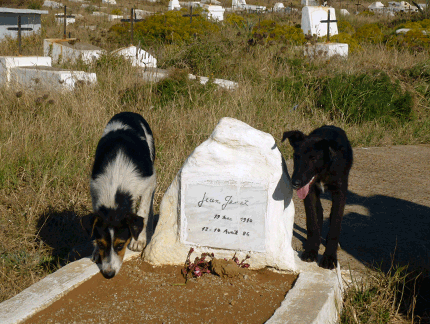This conversation between Stephen Barber and Rustom Bharucha was recorded in Tangier in June 2014, after a day in which many of the Center’s Fellows had travelled to the coastal town of Larache to visit the grave of Jean Genet and also the hotel in which he spent the final years of his life. At his grave in the abandoned Spanish cemetery alongside the cliff-face, two friendly stray dogs were guarding Genet’s grave, one black, one a mix of white and black. One side of the cemetery was bordered by the prison of Larache with its barbed-wire and forbidding sheer walls, and the other side by the spectacular open view of the Atlantic ocean which Genet had loved.
Such opposites, amalgams and contradictions are pivotal to our conversation in its main focus on the creative process of intensive, extended research and writing that drove Rustom’s book Terror and Performance (Routledge, 2014)1. The spectral figure of Genet is especially apposite too, since Rustom’s book begins with an essay-account of his own production of The Maids in Manila and later also interrogates the contemporary resonances of Genet’s own writings on terror, violence and performance, in the context of the 1960s and 70s, alongside those of many other thinkers, theorists, performers and activists – most notably, Gandhi. The conversation explores the interweaving of diverse and initially irreconcilable, contrary elements into a deep, excoriating engagement which both reveals and transforms.
- For further information on the book see: www.routledge.com/books/details/9781138014275/. [↩]



